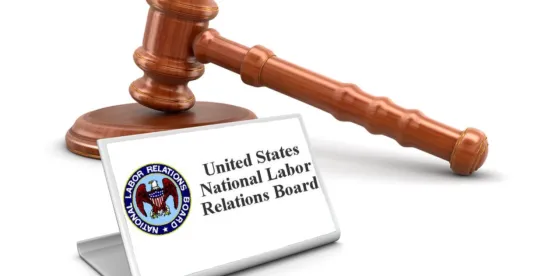We first reported in February 2023 on a surprising and alarming decision by the U.S. National Labor Relations Board (NLRB or “the Board”)—In re McLaren Macomb—which concluded that the mere proffer of a severance agreement with broad confidentiality and/or non-disparagement provisions could violate Section 7 of the National Labor Relations Act (NLRA), which protects the right of employees to engage in concerted activity for their mutual aid and protection. The decision set off alarm bells for employers that routinely include non-disclosure and non-disparagement language in their separation and release agreements, leading some employers to revise their templates and others to scuttle them altogether. Others took a more hopeful, wait-and-see approach until the U.S. Court of Appeals for the Sixth Circuit could review and opine on the merits of the NLRB’s position.
The Sixth Circuit has now spoken. In a September 19, 2024 per curiam decision, a panel of the Sixth Circuit Court of Appeals granted the NLRB’s petition for enforcement of its order and denied McLaren Macomb’s cross-petition for review, thus enforcing the NLRB’s order in full. For those of us for whom hope springs eternal, however, we cling to the possibility that bad facts made for bad law here and that the death knell has not quite tolled on nondisclosure and nondisparagement agreements. For the source of this abiding optimism, we must dig into the facts of the case.
McLaren Macomb employed 2,300 workers at Mount Clements Hospital in Michigan. In August 2019, 351 of the Hospital’s employees (the “Unit”) voted to unionize. In December 2019, the NLRB certified the Unit, with Local 40 RN Staff Council (the “Union”) as the Unit’s exclusive collective bargaining representative. After the COVID-19 pandemic forced the Hospital to scale back certain elective and outpatient procedures, the Hospital furloughed, and later permanently laid off, eleven Unit employees without involving the Union in the decision to terminate them or in the negotiation of the severance agreements it presented to the workers. The severance agreements contained a confidentiality clause that precluded the employees from discussing its terms with anyone other than their spouses, legal and financial counsel, or pursuant to court process. The agreements also contained clauses that prohibited the employees from making statements to other employees or the general public “which could disparage or harm the image of” the Hospital or its affiliates.
The Union filed an unfair labor practice charge with the NLRB. The NLRB’s General Counsel (GC) issued a Complaint based on the Hospital’s failure to involve the Union in the termination decisions, for terminating the employees without affording the Union a meaningful opportunity to bargain, for communicating directly with the represented employees about the terms of their severance agreements, and for including the verboten clauses in the employees’ severance agreements. An administrative law judge (ALJ) initially concluded that McLaren Macomb committed failure-to-bargain and direct-dealing violations, but the ALJ disagreed with the GC that the severance agreements interfered with the employees’ exercise of protected NLRA rights. The NLRB adopted the ALJ’s findings with respect to the Hospital’s failure-to-bargain and direct dealing, but reversed the ALJ’s finding that the severance agreements were lawful. The Board then petitioned the Sixth Circuit for enforcement of its Order.
The Sixth Circuit, whose review of an NLRB decision is “quite limited,” found “substantial evidence” in support of “the [NLRB’s] conclusion that the Hospital failed to bargain with the Union over the” terminations, thus rejecting the Hospital’s procedural and circumstantial (COVID-19 exigencies) excuses for its exclusion of the Union from its decision-making. The appellate court thus also readily concluded that McLaren Macomb engaged in direct dealing when it offered the furloughed employees severance agreements without first discussing their severance—a mandatory topic of bargaining—with the Union. But what employers were really waiting for was the Sixth Circuit’s position with regard to the language of the severance agreements themselves, and once again, the appellate court sided with the NLRB, but not in as full-throated a manner as the Board may have hoped.
Under older NLRB authority—Baylor Univ. Med. Ctr., 369 NLRB No. 43 (2020) (“Baylor”) and Int’l Game Tech., 370 NLRB No. 50 (Nov. 4, 2020) (“IGT”), the NLRB held that including confidentiality and non-disclosure provisions in a severance agreement is lawful, provided the agreement is not “proffered … under circumstances that would reasonably tend to interfere with the separated employees’ exercise of their own Section 7 [NLRA] rights or those of their coworkers.” See IGT, 370 NLRB No. 50. The ALJ applied Baylor/IGT to this case and found that the McLaren Macomb severance agreements were “voluntary, only offered to separated workers, and did not impact their previously accrued benefits” and thus were lawful. The NLRB reversed the ALJ, finding under Baylor/IGT that the failure-to-bargain and direct-dealing were circumstances that showed the Hospital’s intent to interfere with the employees’ exercise of Section 7 rights, but that even if such circumstances were not present, the text of the severance agreements standing alone violated Section 8(a)(1) of the NLRA, thus overruling Baylor/IGT. The NLRB majority (over disagreement by Member Marvin Kaplan) wrote that, even in the absence of additional coercive conduct, an employer should not be “entirely free” to present employees with a severance agreement with terms that on their face chill protected concerted activity.
On appeal, the NLRB advanced both arguments in support of its position that the severance agreements violated Section 7. First, the NLRB argued that the agreements should be deemed unlawful under Baylor/IGT because the proffer of the agreements was “part and parcel of” the additional coercive, unlawful course of conduct engaged in by the Hospital. Alternatively, the NLRB maintained that Baylor/IGT should be deemed overruled and the severance agreements and their purportedly “facially unlawful terms” should be considered unlawful because of its potentially chilling effect on concerted activity.
The Sixth Circuit found that it “need not delve into” complex issues of whether the agreements, on their face, are unlawful because “even under Baylor and IGT, McLaren’s conduct violated Section 8(a)(1).” That is, the Sixth Circuit concluded that it did not need to decide whether Baylor/IGT should be overruled because even if their rationale is applied to the facts before the court, the Hospital’s failure to bargain with the Union over the permanent terminations and the direct negotiation of severance agreements with represented employees constitute “exactly the kind of unlawful conduct from which reasonable employees could infer that the Hospital intended to invoke the severance agreements to interfere with the employees’ Section 7 rights.” Therefore, because of the Hospital’s demonstrated “proclivity to violate the” NLRA, the appellate court affirmed the Board’s conclusion that the severance agreements violated Section 7 under the Baylor/IGT standard.
If there is a glimmer of hope for employers here, then, it is this: The Sixth Circuit appears to view Baylor and IGT as still good law, and but for the overwhelming evidence the Hospital deliberately evaded its bargaining obligations, the court may have been inclined to find the severance agreements were lawful. In other words, a different employer that had not engaged in Union interference may have found a more sympathetic audience for its nondisclosure and nondisparagement terms.
So where does that leave employers now? Unfortunately, with a healthy dose of lingering uncertainty. Would the result have been different without the direct dealing? Would the Sixth Circuit have had any hesitation finding the severance agreements lawful if the employer were non-unionized? The answer, as to both, is possibly. Until such facts are before an appellate court, employers continue to operate without clarity as to the validity of confidentiality and non-disparagement provision in standard separation agreements and should consult with counsel regarding the risks involved before proffering such provisions to employees, particularly if other factors such as union presence or threats of organization complicate the analysis.




 />i
/>i

